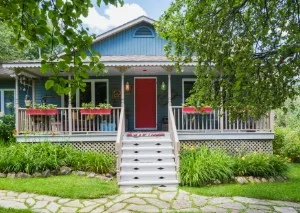Although homeownership takes a significant amount of time, it leaves most Aussies with an asset worth significantly more than what they spent on it.
The rent or buy decision comes down to more than numbers. It's about what you can afford and what you want from life.
Owning a home has many benefts: You have more freedom to renovate and redecorate the property and you are building equity as you pay it off. And no landlord can ever kick you and your family out.
The benefits (and downsides) of renting
Renting offers quite a few benefits, though it can be an uncertain way to live. You can be evicted, landlords often fail to maintain their properties and you end up paying a lot of money that goes nowhere. But if you find an affordable, good-quality place to rent with a decent landlord you might find the convenience and flexibility are worth it. And you aren't tied to a mortgage and a single property for years.
Pros of renting
- Rent is often cheaper than mortgage payments on the same property.
- You don't have a large mortgage debt hanging over your head.
- The landlord pays the rates and body corporate fees on the property and is responsible for repairs.
- You can move more easily and live in areas which would be too expensive for you to buy in.
- Because rent tends to be cheaper than owning a property, you can use any extra money you may have to invest, save or spend as you see fit. This financial flexibility is one of the major benefits of renting.
Cons of renting
- Your home is temporary and you are subject to the decisions of a stranger, your landlord.
- Your landlord can make decisions that affect your life, and may not fulfil all their responsibilities.
- Landlords tend to increase the rent regularly.
- Leases aren't permanent. Your landlord could decide to evict you if they want to sell the property.
The benefits (and downsides) of buying
Equity means the amount of a property you own (once the mortgage debt is subtracted). Properties are worth a lot and generally grow in value over time, so mortgage repayments are a kind of saving, because you're building wealth.
Pros of buying
- Your mortgage payments build up your equity with each payment.
- You have a roof over your head and no landlord to worry about.
- You can personalise and renovate your home to increase its value.
- Property values tend to increase in Australia.
- You can choose to rent out your property if you want to live somewhere else, so your tenant is paying off your mortgage.
Cons of buying
- You'll need to save a large deposit to cover the deposit and fees associated with buying a property.
- Interest charges on your loan can add up to hundreds of thousands of dollars.
- You have to pay for ongoing expenses like strata costs, insurance and council rates – and you may have to spend money on maintaining the property.
- Buying comes with other upfront costs like conveyancer's fees, lenders mortgage insurance premiums and bank fees.
- Stamp duty and real estate agent's fees can eat a huge chunk out of any equity you thought you'd built up if you decide to sell.
Finder survey: How many Australians think taking out a home loan is an achievable goal?
| Response | |
|---|---|
| I already have one | 54.05% |
| Yes- in a few yrs | 14.12% |
| Yes- very soon | 12.41% |
| Maybe- if I work really hard for it | 11.87% |
| No- it's not achievable | 7.55% |
Is it better to rentvest?
Rentvesting is where you buy a property in an area where you can afford, while you continue renting in the area you want to live, but can't afford. Let's say you live in Sydney in a two-bedroom apartment, that costs $800 a week in rent. To buy that apartment might be $1m or more, which is out of your price range.
So, you buy an investment property in Queensland for $500,000. You save a $50,000 deposit and pay lender's mortgage insurance so you can buy with a 10% deposit, rather than the 20% the bank prefers.
Your tenants help you pay off the mortgage in your rental property, while you continue paying rent in the area you want to live in. Over time your investment property will grow in value while it's being paid off, so you'll eventually own it in full. In the meantime, you can continue renting in your desired location, and perhaps even use the money you make from your investment property to help you buy a home to live in one day.

"Trying to save in order to get into the area that the person wants very rarely works out, unless they are able to save faster than property prices are rising in that particular area. So, they are better off buying what they can afford in an area they can afford when they are ready and then letting the market appreciate and move into an area that is more desirable to them once they have built up some equity. Once you have your deposit and your mortgage approval in place and you have figured out what it is that you can spend, you then need to figure out your brief. Doing this up front will save you valuable time as you may discover that you are looking for something that is not achievable in your chosen area or price point. "
Is buying always cheaper in the long run?

Renting is money you'll never get back. But when you buy a property you need a mortgage. And the amount of interest you pay over the life of the loan can end up being very significant.
To figure out whether home ownership or renting is cheaper in the long run we need to look at how much a person will have to spend per week on housing as an expense if they choose to take on a home loan or rent. A key thing to remember is that buying a property includes the costs of maintenance/strata, council rates and water. Renting does not include any of these costs.
For simplicity, let us assume:
- 1% growth per year in property maintenance/strata, water bills, electricity bills, and council rates
- an average 4% interest rate over 30 years
- a 20% deposit, and $500 in extra monthly payments.
With those assumptions, the model shows young Australians looking to buy the average house will have to own it for over 37 years to start coming off better in weekly housing expenses compared to renting. For the average unit, they will have to own it for over 32 years to come off better than life time-long renters.
All this means, young Australians who purchase a first home at the age of 30, will be well into their late 60s before they start breaking even on total housing costs compared to life-long renters. In effect, young Australians face a 'mortgage hangover', having to own a home 11 years after paying off the mortgage to break even with renters.
After 37 years of owning a house, young Australians will have spent $1,599,732 on housing costs, which would be equivalent to $910 in rent per week. For the average unit, after 32 years, they will have spent $1,116,282 or the equivalent of $763 in rent. The key take away from this is that home ownership remains expensive for a number of years even after paying off the home loan. But owning a home does become cheaper than renting only in retirement.
Also, most importantly, at the end of this period – the homeowner owns an asset worth hundreds of thousands of dollars, perhaps even over $1m. Meanwhile the renter has no asset to their name. This is what makes home ownership the better choice for most people.
But rent and property values tend rise over time
One advantage of buying a home is the equity built up over time. Although this doesn't discount the total money spent on housing costs, it provides an asset that can be used for other purposes.
Using the annual growth rate of home prices for the last 20 years, the average Aussie breaking even on house after 37 years will have an asset worth 475% more than what they paid for it over that period. On units they will have an asset worth 164% more.
One of the easiest ways homeowners can break even compared to renting faster is by making extra payments. RBA data shows excess payments on home loans have fallen to $3.441 billion per quarter, which is the lowest since September 2019.
On average, increasing the extra payments from $500 to $2000 per month will save homeowners 9 years on a home loan for house, and 8 years on a unit. This translates to breaking even 4 years faster on a house, and 3 years faster with a unit.
And once you've paid the mortgage off, your biggest living expense is finished. Meanwhile, renters are still making that weekly rental payment.
Rent or buy: The choice depends on you
The decision to buy or rent is not a debate, it's a question whose answer depends on your life goals and financial position. Here are some hypothetical scenarios.
If you have a family and you want some stability and security then buying makes sense. If you're already established in a neighbourhood (maybe your kids are in school and are very happy there) and you can afford to buy there, even better.
If you live in a pricey, popular neighbourhood and are happy there you might consider renting or even rentvesting. This way you're building slow, steady wealth through a property investment while enjoying the flexibility of rent.
Sources
Ask a question
More guides on Finder
-
Should I make a pre-auction offer on a property?
A guide to making a pre-auction offer, how to do it properly, when to do it and when not to do it.
-
What is a Section 32 or Vendor’s Statement?
We run through Section 32 statements and talk about what important facts are contained in these documents.
-
What is a Section 173 Agreement?
A Section 173 Agreement is a contract between a local council and a landowner about what can be done with the land. If you own property in Victoria, learn about how Section 173 Agreements work here.
-
Sinking fund and strata properties: What you need to know
A sinking fund is an essential financial plan for any strata scheme, allowing the owners’ corporation to set aside funds for future capital expenditure.
-
What does “under contract” mean?
The words “under contract” don’t necessarily mean that a property sale is a done deal. Find out more about this term here.
-
Buying a house in the 80s versus today
Find out the scary differences in owning a home in 1984 compared to 2025.
-
Property inspections when buying a home
What everyone should know about property inspections and why it’s an important task to complete before committing to a purchase.
-
Costs of buying a house or unit
Work out all the upfront costs of buying a house with our handy guide.
-
Joint home loan: Tips for co-buying property
A joint home loan could be your ticket to home ownership with a spouse, friend, relative or partner. Learn more about joint home loans and compare offers today.
-
Bank valuation vs market value: What’s the difference?
A property's market value helps determine how much it could sell for while a bank valuation helps a lender determine its risks, and the two values can be very different.

